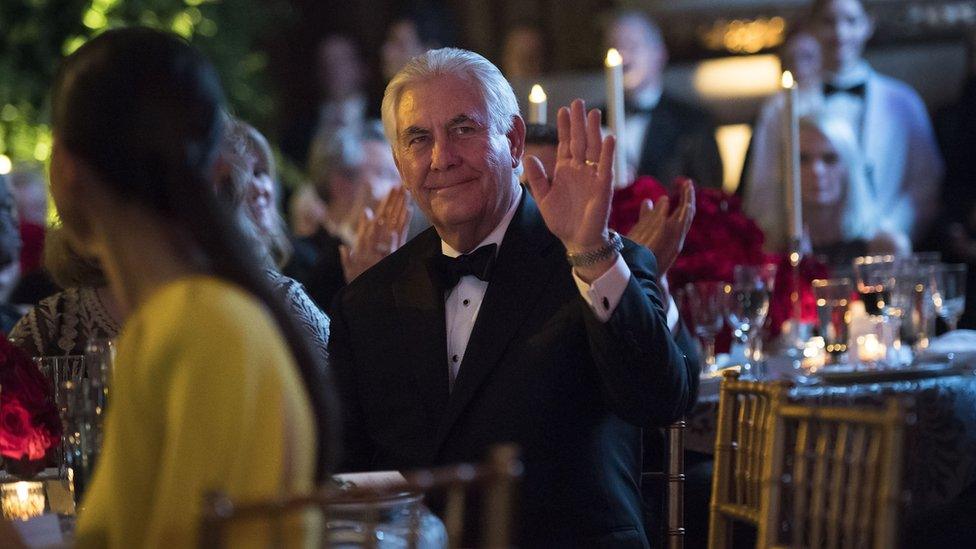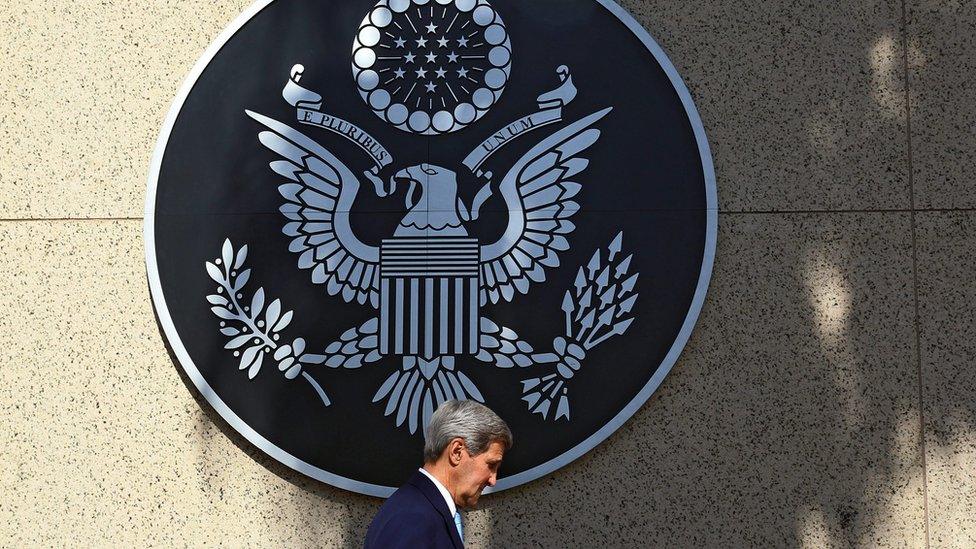Rex Tillerson: New US secretary of state faces tough task
- Published
Tillerson's folksy introduction to his department: 'Hi, I'm the new guy'.
The 69th US Secretary of State Rex Tillerson is taking charge of a state department distressed and anxious about Donald Trump's turbulent first days in office.
The uneasiness began with an unorthodox overhaul of senior staff positions, and escalated into a simmering revolt against a controversial policy seen as cutting to the core of the department's work and values.
In Mr Tillerson's inbox is a "dissent cable" opposing President Trump's temporary ban on refugees and travellers from seven majority Muslim nations, signed by more than 1,000 foreign service staff.
The ban was imposed in order to review security checks, but the cable argues that the way it's being carried out will be ineffective and counterproductive. More than that, it says the executive order, external betrays fundamental principles of equality, openness and non-discrimination.
"We're sworn to defend and protect the constitution," said one official who'd signed the document, "and are duty bound to speak out when constitutional values are at stake."
Rex Tillerson - the wild card diplomat
Diplomats' dissent falls on deaf ears
Mr Tillerson, who comes with years of business experience at Exxon Mobil but none in government or diplomacy, will need to find a way to both address such deep concerns and to work with a Trump White House bent on shaking up the system with quick pronouncements of change.
In a debut speech kicking off his first day on the job he signalled he would take a more traditional approach than his boss, praising the expertise of the diplomatic corps and saying he would depend on it.
But he'll be learning the ropes with a lack of experienced personnel at the top, including those who would oversee the implementation of this controversial policy.
"Why would you get rid of the heads of administration and consular affairs when you've just done something that affects so many visa and documentation issues?" muses Richard Boucher, a long-time career ambassador.
Mr Boucher has seen administrations come and go - he served as a spokesman or deputy spokesmen in six of them, both Republican and Democrat.
It's perfectly normal, he says, to clean house at the top during a transition. What isn't normal is the way this administration went about it: abruptly, without overlap or immediate replacement, clearing out management as well as policy positions.

Rex Tillerson ran one of the world's biggest oil companies, but he has never worked in diplomacy
Of approximately 40 posts that need Senate approval, only six or seven have been filled, according to Tom Countryman.
Until Friday, he was the assistant secretary of state for international security and non-proliferation, expecting to retire sometime later in the year.
So he was surprised to be told that his retirement would begin in two days. He cut short a trip to Amman, where he was discussing nuclear non-proliferation in the Middle East, cancelled a planned meeting in Rome, and flew home to clear out his desk.
In most cases there continue to be capable deputies running the show, he says, but the "vacuum" at the very top will make it difficult for Rex Tillerson to "get a running start".
Rex Tillerson being sworn in as secretary of state
The Texan oilman has been hobbled at the starting gate with delays over his confirmation, leaving old timers and newcomers in the department warily adjusting to each other.
Career diplomats have said some of the new officials don't tend to engage, keeping the doors to their offices closed.
One employee fresh off the Trump campaign described co-workers as "experienced" and "great assets" but said she'd been forewarned that the scene could be "liberal and cliquey".
Trump border policy: Who's affected?
But the opposition to the immigration order is much more than a culture clash.
"I've never heard of anything close to this [number of signatures]," says Jon Finer, who handled such cables in his position as director of policy planning for the former Secretary of State John Kerry.
The dissent channel is an established avenue for diplomats to express alternative viewpoints without fear of retaliation. In some years it's barely used, in others there's a lot of traffic - like during the Vietnam War, and the conflicts in Bosnia, Iraq and Syria.
Who is Rex Tillerson?
The BBC first heard about the cable from diplomatic sources overseas. As the document circulated informally between foreign missions and Washington headquarters, it grew to 155 pages of signatures, according to a source close to the process.
Officials said it was fuelled by the distress of people on the frontlines charged with implementing a policy that had been sprung without warning or consultation, leaving them to deal with confusing details and navigate the impact on individuals and relations with foreign countries.
Mr Tillerson has not clarified his position on the executive order, but he did acknowledge the fallout from a "hotly contested" election and appeared to allude to the concerns of his new employees.
He told them they were entitled to the expression of their political beliefs, but couldn't let these overwhelm their work as a team.
The White House, on the other hand, has taken a tough line.
Spokesman Sean Spicer said dissenters "should either get with the programme or they can go", although he later added that they had the right to speak out but not to refuse implementation of a lawful order.
There've been no reports of such obstruction, but some who agreed with the sentiment of the memo chose not to sign because they were afraid the new administration would take retaliatory measures, one career officer told the BBC.

Former Secretary of State John Kerry is believed to be working on a memoir of his time in politics
Tom Countryman said it would be important for the new secretary of state to make clear he'd protect his employees from any retribution.
In a speech at his goodbye party, Mr Countryman pushed back against the anger, encouraging his colleagues to stay in their positions, "because a foreign policy without professionals is - by definition - an amateur foreign policy. You will help to frame and make the choices".
Other administrations have come in suspicious of the state department because it works with foreigners, he told the BBC, "and for a party that's xenophobic, that's a real suspicion".
"But every other administration and president has come to rely on the foreign service and I hope this one will do the same… Early signs are not encouraging."
Rex Tillerson's approach will be crucial in forming a working relationship between the state department and the White House.
He has a reputation for competence, for relying on experts and for trusting the people who work for him. And state department officials are relieved to finally have someone at the helm.
"He said all the right things, boiler plate stuff that any incoming person should say," said the career officer, "so in normal circumstances it would be unremarkable, but in today's reality, where saying the traditional thing is so rare, it was a welcome sense of stability and normalcy."